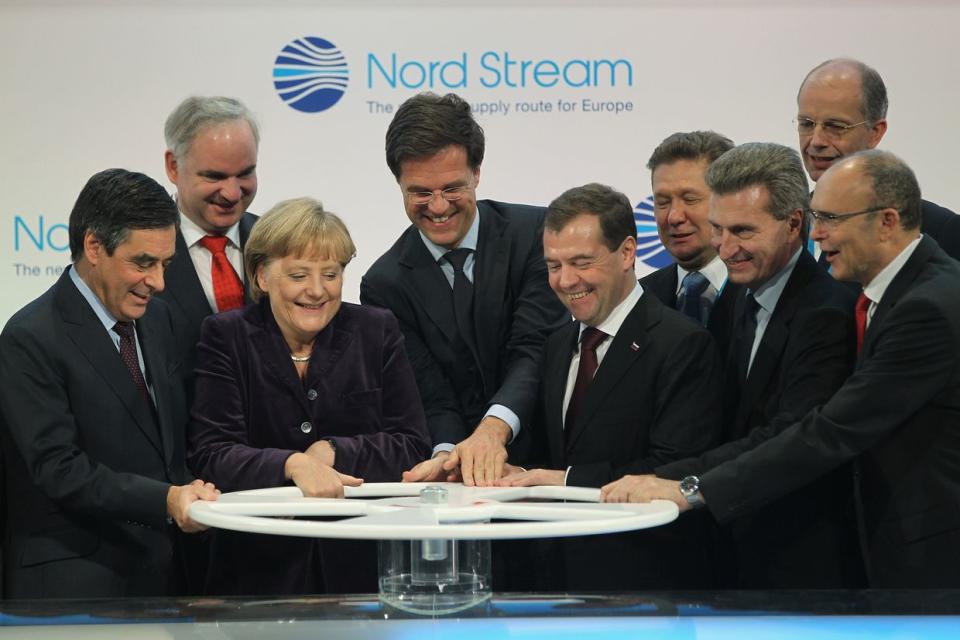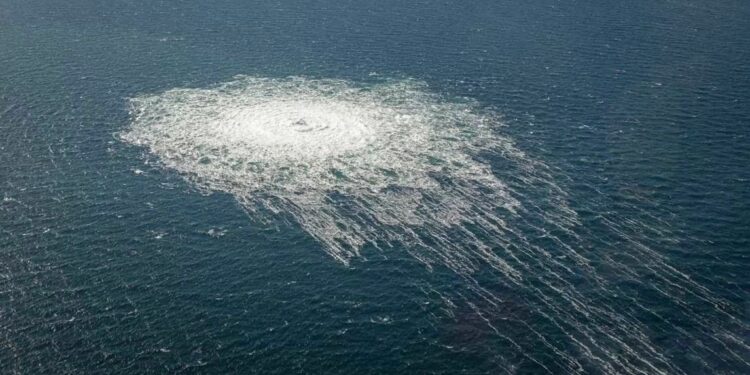Former US President and Republican presidential candidate Donald Trump delivers remarks to the press at Trump Tower in New York City, U.S. on Sep. 26, 2024. (Angela Weiss / AFP via Getty Images)
Trump’s comments on Nord Stream fit in a larger pattern of invoking Ukraine to attack his then-political opponent, Biden.
The former president also claimed that he had “stopped” the pipeline project while in his office and alleged that it was under Biden that it flourished.
For Trump and others who repeatedly warn that U.S. support for Ukraine would lead to escalation with Russia, the implication of Ukrainian involvement in the explosion is yet another example.
Just days after the explosion was first reported, Trump shared old comments from Biden, in which he said, “If Russia invades…then there will no longer be a Nord Stream 2. We will put a stop to it.”
Trump added: “Wow, what a statement. World War III, anyone?”
Nord Stream and the eastward shift of the EU’s power centers
Among European countries that support Ukraine, the pipeline explosion has also been used as a rhetorical tool, but for another purpose — to castigate Germany for leading the charge in cementing the EU’s dependence on Russian energy in the first place.
Polish Prime Minister Donald Tusk made waves in August 2024 when he responded to the suggestion of Warsaw’s involvement by saying, “To all the initiators and patrons of Nord Stream 1 and Nord Stream 2. The only thing you should do today about it is apologize and keep quiet.”
While he did not mention anyone by name, it was clear he was referring to Germany, the main “patron” of the project.
Czech President Petr Pavel went even further, saying that even if Ukraine was behind the attack, the pipeline would have been “a legitimate goal” for Kyiv to try and cut energy revenues flowing back to Moscow.
German allegations that Poland may have been involved were “inspired by Moscow” with the aim of destabilizing NATO, said Krzysztof Gawkowski, a deputy Polish prime minister and the minister of digital affairs.
Critics of the pipeline, which included many in central and eastern Europe, had long argued that Germany was misguided in going forward with the project.

(From L to R, first row) French Prime Minister Francois Fillon, German Chancellor Angela Merkel, Dutch Prime Minister Mark Rutte, Russian President Dmitry Medvedev, and European Union Energy Commissioner Guenther Oettinger turn a wheel to symbolically start the flow of gas through the Nord Stream Baltic Sea gas pipeline at a ceremony in Lubmin, Germany on Nov. 8, 2011. (Sean Gallup/Getty Images)
Beyond eliminating potential profits that an overland pipeline could give Poland and other countries, Nord Stream deepened the EU’s dependence on Russian energy and raised fears long before the full-scale war that Moscow would use such reliance as a tool to exert pressure.
When Russia did just that after February 2022 — threatening to cut off energy supplies to the EU in response to its support for Ukraine, there was a sense of vindication from those who had long warned of the threat of energy dependence.
The bloc’s response to Russia’s full-scale invasion, in which Poland, Czechia, the Baltic states, and other countries previously thought to be on the periphery of the center of power in Brussels have emerged to be most committed to its defense from Russia, have fueled the argument that Germany’s policy was a failure.
Shop now
We’ve been working hard to bring you independent, locally-sourced news from Ukraine. Consider supporting the Kyiv Independent.
Source link : http://www.bing.com/news/apiclick.aspx?ref=FexRss&aid=&tid=66fc11dabe924fe4856122efd6ee5c65&url=https%3A%2F%2Fwww.yahoo.com%2Fnews%2Ftwo-years-nord-stream-explosion-144858136.html&c=66546957241983816&mkt=de-de
Author :
Publish date : 2024-10-01 08:09:00
Copyright for syndicated content belongs to the linked Source.


